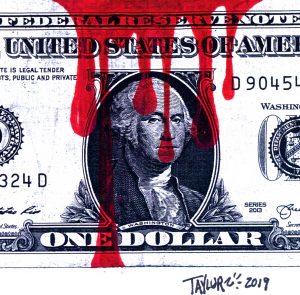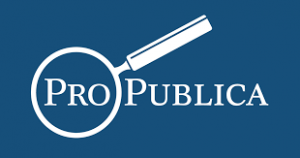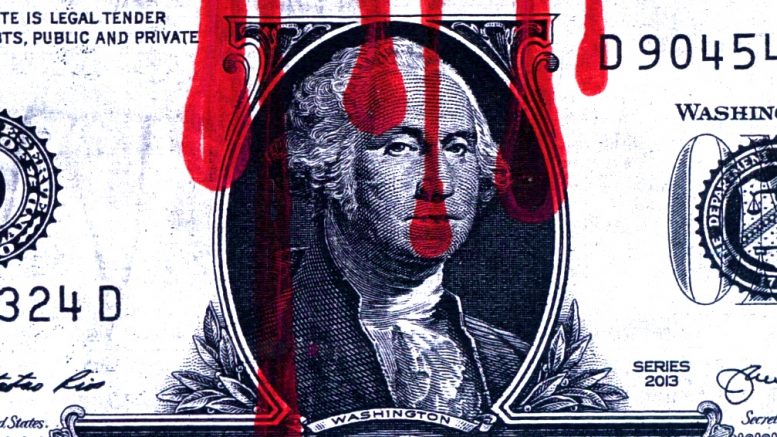
By Lee Fang
The Intercept (3/19/20)
IN RECENT WEEKS, investment bankers have pressed health care companies on the front lines of fighting the novel coronavirus, including drug firms developing experimental treatments and medical supply firms, to consider ways that they can profit from the crisis.
The media has mostly focused on individuals who have taken advantage of the market for now-scarce medical and hygiene supplies to hoard masks and hand sanitizer and resell them at higher prices. But the largest voices in the health care industry stand to gain from billions of dollars in emergency spending on the pandemic, as do the bankers and investors who invest in health care companies.
Over the past few weeks, investment bankers have been candid on investor calls and during health care conferences about the opportunity to raise drug prices. In some cases, bankers received sharp rebukes from health care executives; in others, executives joked about using the attention on Covid-19 to dodge public pressure on the opioid crisis.
Gilead Sciences, the company producing remdesivir, the most promising drug to treat Covid-19 symptoms, is one such firm facing investor pressure.
Remdesivir is an antiviral that began development as a treatment for dengue, West Nile virus, and Zika, as well as MERS and SARS. The World Health Organization has said there is “only one drug right now that we think may have real efficacy in treating coronavirus symptoms” — namely, remdesivir.
The drug, though developed in partnership with the University of Alabama through a grant from the federal government’s National Institutes of Health, is patented by Gilead Sciences, a major pharmaceutical company based in California. The firm has faced sharp criticism in the past for its pricing practices. It previously charged $84,000 for a yearlong supply of its hepatitis C treatment, which was also developed with government research support. Remdesivir is estimated to produce a one-time revenue of $2.5 billion.
During an investor conference earlier this month, Phil Nadeau, managing director at investment bank Cowen & Co., quizzed Gilead Science executives over whether the firm had planned for a “commercial strategy for remdesivir” or could “create a business out of remdesivir.”
Johanna Mercier, executive vice president of Gilead, noted that the company is currently donating products and “manufacturing at risk and increasing our capacity” to do its best to find a solution to the pandemic. The company at the moment is focused, she said, primarily on “patient access” and “government access” for remdesivir.
“Commercial opportunity,” Mercier added, “might come if this becomes a seasonal disease or stockpiling comes into play, but that’s much later down the line.” …
Read The Rest And Damning Audio Clips
*****
Here’s Why Florida Got All the Emergency Medical Supplies It Requested While Other States Did Not

A chaotic distribution plan is buckling under a big problem: Nobody has enough.
By Lydia DePillis, Mike Spies, Joshua Kaplan, Kyle Edwards & Caroline Chen
ProPublica (3/20/20)
On March 11, Florida requested a cache of emergency supplies from the federal government to protect its medical workers against the novel coronavirus.
Three days later, the state got everything it wanted.
Other states had only tiny slivers of their requests fulfilled, including some that had asked for them earlier than Florida. Oregon and Oklahoma received only about 10%; New Jersey got less than 6%.
This disparity has not been lost on the states that feel shortchanged in their requests from the Strategic National Stockpile, a trove of supplies managed by the U.S. Department of Health and Human Services.
Officials fear that hospitals will be overwhelmed by far more patients than they can safely treat if the current pace of infections continues. This month, officials estimated that if the outbreak lasts a year, the U.S. could need 3.5 billion of the N95 masks that protect health care workers. The national stockpile had only 12 million N95 masks and 30 million surgical masks on hand when the crisis began.
Dwindling reserve
While it may appear like the federal government is playing favorites, federal officials said their decisions were based on their best assessment of relative needs. HHS told states this week that it is giving out 25% of the stockpile to states according to population size, and sending another 25% strategically to states with the most severe outbreaks, which can be used for needs such as testing passengers on cruise ships brought back to shore. The remaining 50% will be held in “strategic reserve,” to be used if there’s a huge spike of critical needs around the country.
The inability of the United States to deploy widespread testing for the coronavirus has further complicated how the supplies are being apportioned because health officials do not have a complete picture of where the virus is circulating most widely. But many states, worried that their case counts are about to soar and their hospitals will be swamped, have been unsatisfied with their allotment.
The system appears to roughly conform to states’ populations, rather than the size of their requests. Florida, a state of 21 million, got all 180,000 N95 masks it wanted. Oregon, a state of 4 million, only received 40,000 of the 400,000 masks it requested, and New Jersey, a state of 9 million, got 85,000 of the 2.9 million masks it feels it needs.
It is hard to assess what constitutes a reasonable request. All states are starting with different stockpiles of supplies. Some have been hit harder than others by the virus, and some anticipate they might be. Each state is trying to secure as much as possible for its health workers, who are raising alarms that they are running out of basic supplies. …

